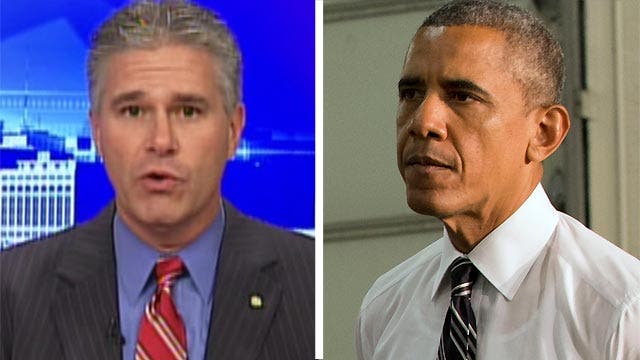Wisconsin AG on suit against Obama over immigration action
Claims president has overstepped authority
This is a rush transcript from "Your World," December 17, 2014. This copy may not be in its final form and may be updated.
NEIL CAVUTO, HOST: All right, well, taking action against executive action -- a federal judge saying that President Obama making illegal immigrants legal is unconstitutional.
Now, that`s welcome news for Wisconsin`s attorney general, J.B. Van Hollen. His state is suing to stop the president`s new rules for illegals.
But that`s a lot easier said than done, right, Attorney General?
J.B. VAN HOLLEN, WISCONSIN ATTORNEY GENERAL: Oh, certainly it`s easier said than done, but we have succeeded in suing the president in the past, ObamaCare being a key example.
He overstepped his bounds. He violated the Constitution of the United States of America. We held him accountable. Of course, ObamaCare wasn`t thrown out, but he was found have violated the Constitution in a couple of different areas.
And we have no doubt in our minds, myself and 23 other states, that he`s grossly overstepped his legal authority here. The laws are just advisory to this president. And that`s dangerous.
CAVUTO: All right, but you`re a lawyer. I`m not. And I`m told that executive orders sort of become this force of nature that`s hard to reverse, you know, unless entirely slapped down by the Supreme Court. And short of that, they stick. Is that true?
VAN HOLLEN: Well, it`s true in part.
Obviously, a federal court at any level can enjoin the president of the United States for his illegal activity. That`s what we`re hoping will happen sooner than later in the Southern District of Texas, where we have brought this lawsuit. We want to make sure before these four to five million...
CAVUTO: Why did you? Why? You`re in Wisconsin. Why did you do that?
VAN HOLLEN: The costs to the state are immense.
We have certain things that, under this law, we are going to have to provide to these four to five million national illegal immigrants, such as drivers licenses. They are going to get Social Security numbers, the ability to get work permits. They are going to get unemployment benefits.
Very importantly, in Wisconsin, where we have permits for concealed- carry of firearms, they are going to be able to lawfully carry firearms, when they are not even lawfully in the country.
CAVUTO: So, you know, I`m looking at your suit, sir, and I`m looking at what -- where this is going. And nothing is reversing the president`s plans to set up, I guess, the infrastructure, for lack of a better word, to get these deportations slowed, if not outright stopped.
I had a border sheriff who was telling me the figures we`re talking about are closer 20 million, because if you are planning deportations -- I think I got this right -- I`m a little thick -- that it`s going to -- no one who is on a deportation list need worry now that he or she is going to be hauled back south of the border.
Is that true? In other words, are these numbers far bigger than we`re being told?
VAN HOLLEN: Well, they can be.
But even with the smaller numbers that I laid out, the conservative numbers, they have a huge fiscal impact on all of the states. And that`s where the states have a significant interest. When we have natural and fiscal reliance on federal laws, to have a president who is going to ignore those laws and cost those states money, somebody has to bring him into the courts, try to hold him accountable, so that we still have the checks and balances and the separation of powers that make this country function.
CAVUTO: But, bottom line, if you`re an illegal, and you`re here, you have very little to fear that any time soon someone in the middle of the night is going to haul you out of wherever you are and send you south of the border, right?
VAN HOLLEN: Yeah, the big deal right here is not that they are really getting amnesty from being deported, because how the president has couched this is that he`s using prosecutorial discretion, meaning he`s just deciding, these are a group of people who we`re not going deport out of a huge group of people that we don`t have the resources to deport anyway.
CAVUTO: Yes, but he`s focused on deporting...
VAN HOLLEN: The problem is, is he`s...
(CROSSTALK)
CAVUTO: ... the murderers and the rapist, that sort of thing, those who are a real threat to society.
VAN HOLLEN: Yes.
CAVUTO: But that`s picking and choosing here. We may not know.
VAN HOLLEN: The problem with this -- Neil, the problem with this executive order is that he`s conferring positive benefits on these illegal immigrants...
CAVUTO: I see.
VAN HOLLEN: ... something that isn`t within prosecutorial discretion and something that he`s going to be requiring the states to confer upon these individuals.
It`s something that we have heretofore chosen not to do. And he does not have the legal authority to force our hand to do that.
CAVUTO: All right, Attorney General, thank you very, very much.






















